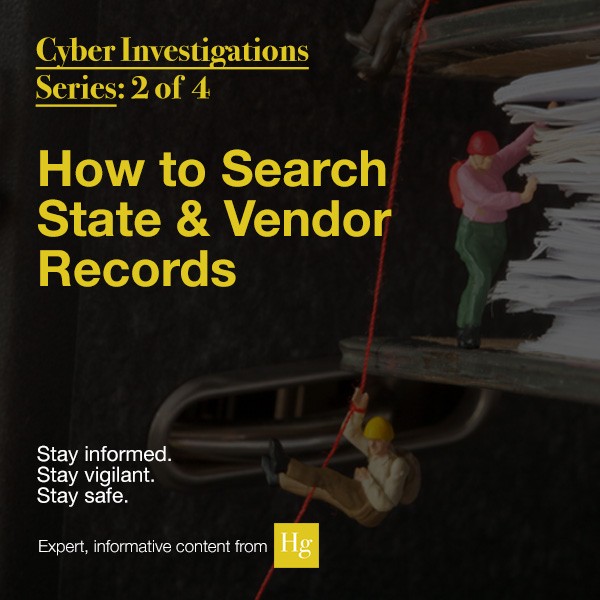By Cynthia Hetherington
 Inevitably, investigations will always come down to legal and regulatory violations or sanctions, whether a foreign government or a sex offender list. In this 4-part blog series, we examine the various investigative trails that develop because of involvement with, or violation of, government regulatory issues. These trails of so-called dirt are grouped into six categories:
Inevitably, investigations will always come down to legal and regulatory violations or sanctions, whether a foreign government or a sex offender list. In this 4-part blog series, we examine the various investigative trails that develop because of involvement with, or violation of, government regulatory issues. These trails of so-called dirt are grouped into six categories:
Local, State, and Federal Court Records
Licensing Boards and Disciplinary Actions
Trails of Financial Crimes
Publicly Traded Companies and Security Dealers Compliance Actions
Government Watch Lists
Sanctions, Terrorists, and Other Law Enforcement Sources
When companies and/or people are found on regulatory lists, it does not necessarily mean they are suspected of crimes or should be avoided completely. Instead, the circumstances should be examined and understood—especially in the cases of very large companies. For example, one section of a company might be responsible for a seemingly egregious error, but, in reality, is merely a minor issue meriting a fine and a wrist-slap. In comparison, an ethics violation in the sports world, appearing to have been covered up, might result in, say, a penalty filed against one NFL player, which subsequently is then captured by the media and results in a lifetime suspension of that player and a call to remove the NFL Commissioner, with sweeping regulatory changes to follow.
Last week we reviewed where to look for records. This week we explore vendor resources and state resources.
Once You Find the Case
Once a civil or criminal matter is located, it is important that you understand and repeat clearly what the citation, docket sheet, or case file states. The docket sheet (list of events that occurred) will give you dates, parties, and some idea as to the conclusion or disposition. However, it may be necessary to send a public record retriever to the court that is housing the case file. The retriever can photocopy the file and send the proceedings to you. These large files can take hours or longer to review but are worth the time. The details within the case files, especially civil business matters, will indicate many interesting details, such as associates that you have been trying to match up and, perhaps, brought in to testify as a witness. The appended case files also can help you find assets you may have been looking for.
Vendor Resources
Some recommended vendor resources include:
- LexisNexis, Bloomberg Law, and Westlaw, specializing in providing criminal record data to the legal industry
- BRB’s Public Record Retriever Network to find an on-site record searcher to visit a local court
- Tracers, Thomson Reuters Court Express, and LexisNexis for record retrieval services
There are several vendors who have assembled a proprietary database of criminal record data. While these database searches are low-cost and quite useful, they should be only considered as supplemental. Despite the sometimes-misleading advertising, there is no national database of criminal record data.
State Resources
There are two other significant state resources of criminal records: The state prison system (incarceration records), and the agency that maintains the sexual offender records. Most of these state agencies offer online access to portions of their records; their sexual predators lists are always worth a check. Yes, it’s difficult to imagine your neighbor, or the executive living up the block, being noted as a sexual predator, but remember that there is no one type of person who decides to victimize others. Always check these handy and important state lists for your subject. Keep in mind that some states remove the information from the Department of Corrections website after a period of time when the inmate leaves the prison.
State Sex-Offender Registers can be located at most of the state registry websites, and with vendors such as IRBsearch, CLEAR, TLO, Tracers, and LexisNexis, to name a few. Also, check State Prison Inmate Locator (www.corrections.com/ links) and the state searches (www.vinelink.com). Additionally, the U.S. Department of Justice’s Dru Sjodin National Sex Offender database (www.nsopw.gov) is for searching across multiple states.
Outside the U.S., check on the laws of that country to see if criminal histories are available, and if they require a signed release.

Are you an analyst or investigator looking for advanced #OSINT training ? If so, check out Hg’s webinar series, where you can attend live sessions and receive CEUs or watch previously recorded sessions to beef up your investigative skills.

Are you interested in working with an international company but unsure if it’s legitimate? As veteran investigators in cyber investigations, Hg understands the business world and the legal and regulatory frameworks in which corporations and privately held companies operate. Our skilled analysts excel at exposing financial risks, reputational issues, criminal activity, and legal actions detrimental to your personal and business stability. Learn how our team can arm you with the data you need.
 Cynthia Hetherington, MLS, MSM, CFE, CII is the founder and president of Hetherington Group, a consulting, publishing, and training firm that leads in due diligence, corporate intelligence, and cyber investigations by keeping pace with the latest security threats and assessments. She has authored three books on how to conduct investigations, is the publisher of the newsletter, Data2know: Internet and Online Intelligence, and annually trains thousands of investigators, security professionals, attorneys, accountants, auditors, military intelligence professionals, and federal, state, and local agencies on best practices in the public and private sectors.
Cynthia Hetherington, MLS, MSM, CFE, CII is the founder and president of Hetherington Group, a consulting, publishing, and training firm that leads in due diligence, corporate intelligence, and cyber investigations by keeping pace with the latest security threats and assessments. She has authored three books on how to conduct investigations, is the publisher of the newsletter, Data2know: Internet and Online Intelligence, and annually trains thousands of investigators, security professionals, attorneys, accountants, auditors, military intelligence professionals, and federal, state, and local agencies on best practices in the public and private sectors.



